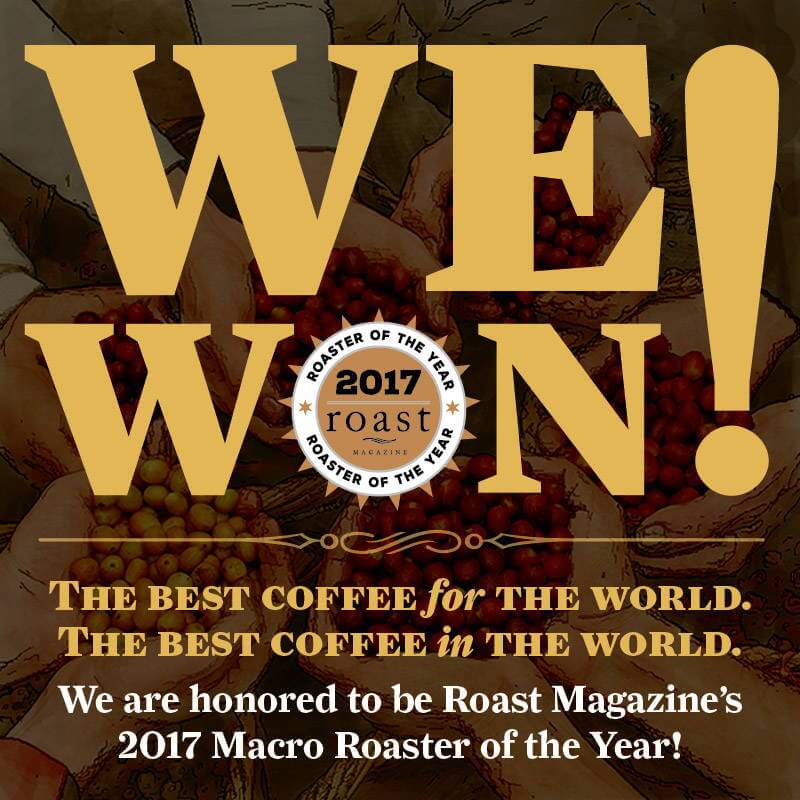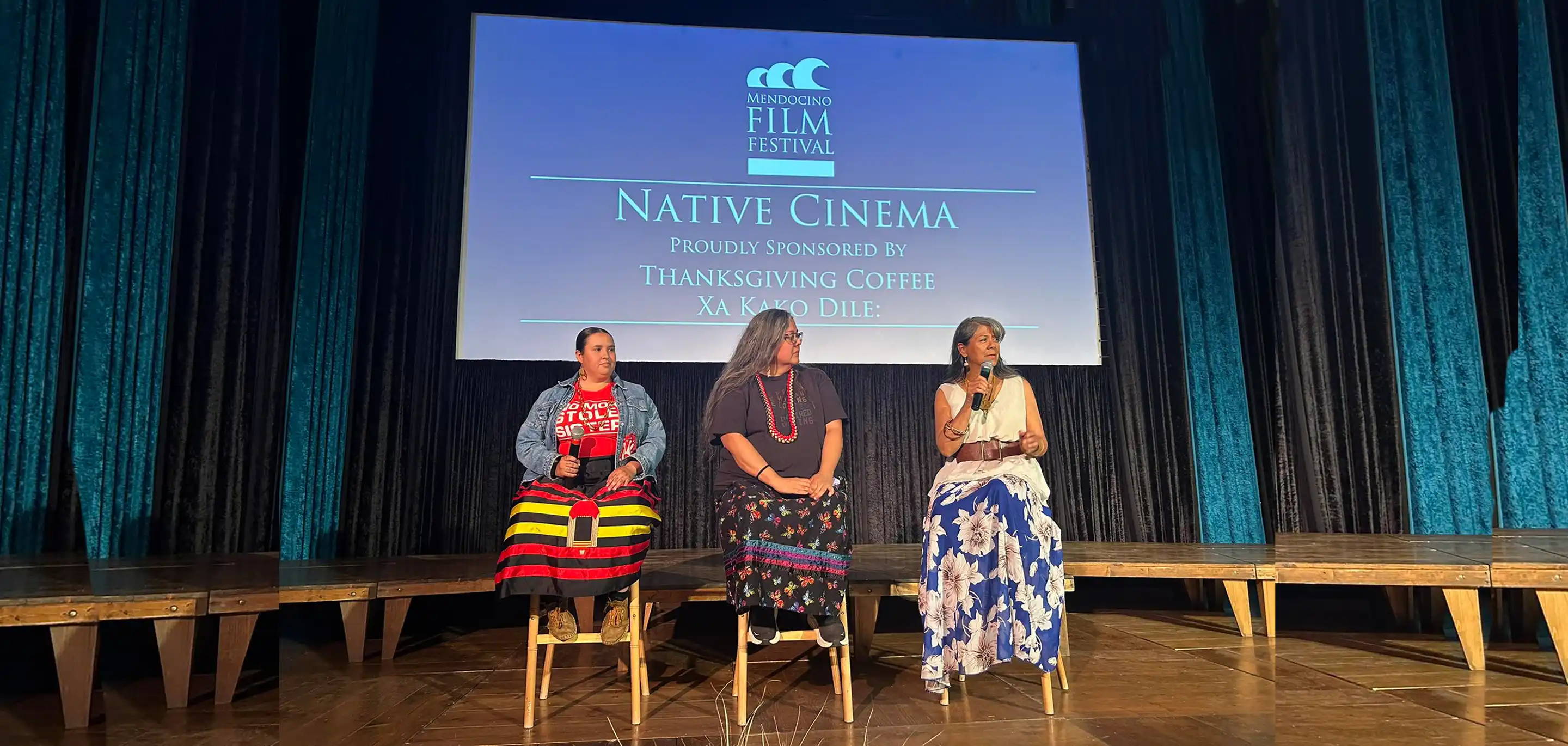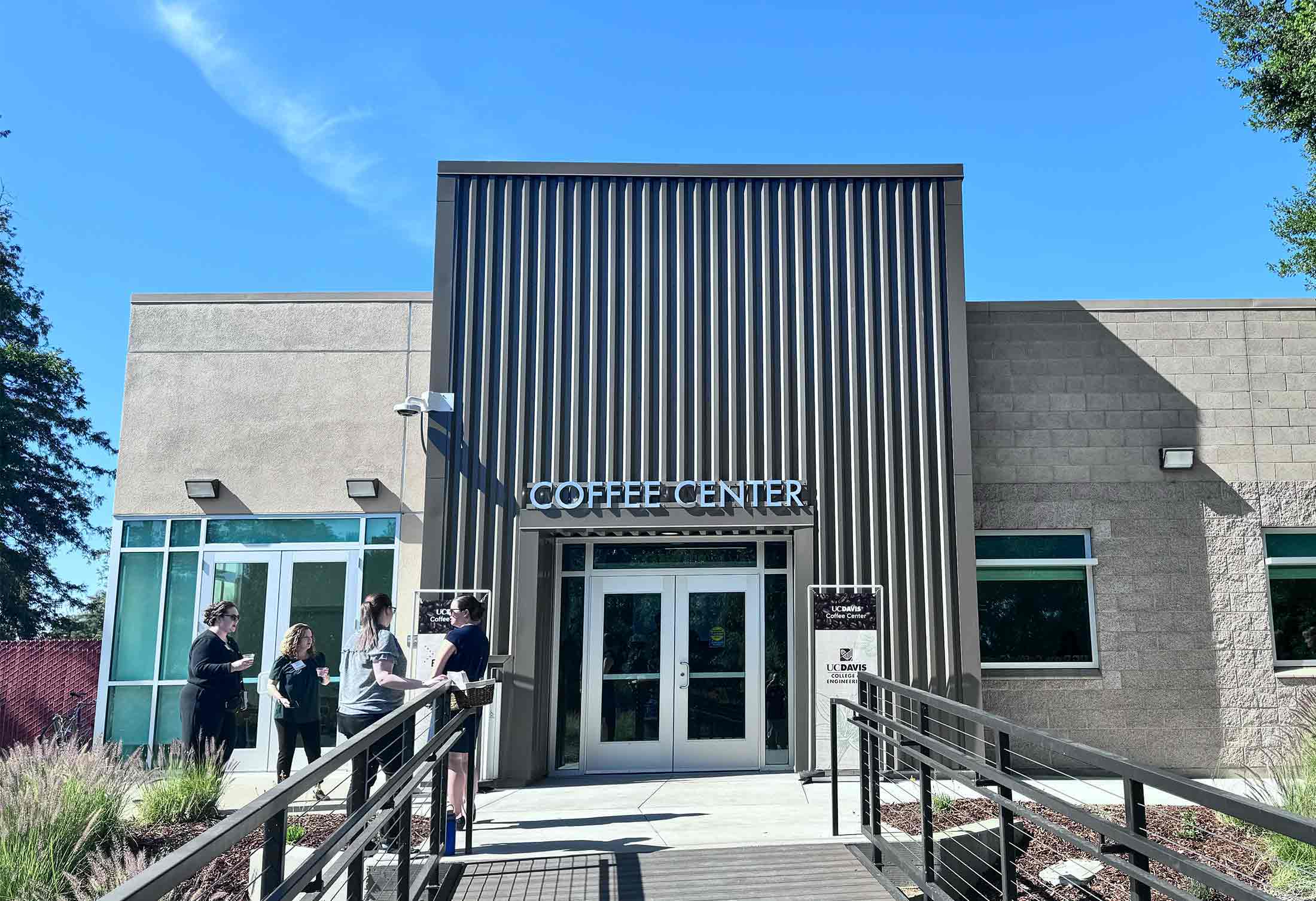
Our Blog
Roaster of the Year: Thanksgiving Coffee Company
View BY :
ONCE IN A LIFE TIME AWARD
We are beyond excited to announce that we have been chosen as the 2017 Macro Roaster of the Year! This prestigious award is chosen through a vigorous process by Roast Magazine, and we are so honored to have been selected.
Pictured Below: The Thanksgiving Coffee team outside our Fort Bragg headquarters
Roaster of the Year Selection Process
The selection process at Roast Magazine is truly impressive. In order to apply, the team at Thanksgiving Coffee compiled a 30 page booklet, outlining some of the most fascinating aspects of our company:
- Our humble beginnings in 1972, along the Mendocino Coast.
- The history of the causes we’ve supported over the past 40+ years.
- Farms and co-ops that we’ve worked with for decades.
- Our certifications we have acquired over the years.
Pictured Below: CEO Paul Katzeff at the original headquarters in Noyo Harbor
Choosing the Coffee: Blind Tasting
Being Roaster of the Year is not just about what we've done or where we came from… it’s about the coffee. After choosing the finalists from the information submitted to them from coffee roasters around the globe, Roast Magazine does a blind taste test. More from Unpacking Coffee Video
Pictured Below: Roastmaster Jacob Long in the Roastery
For this test, they asked each finalist to submit three roasts, and our roastmaster Jacob Long made the decision:
“This is an international competition, we were competing against the best artisan roasters from around the world. With so many great coffees to select from, I chose to present the judges with a few of our freshest coffees with amazing flavor profiles, vibrant and rich Kenyan Peaberry, floral Ethiopian Gedeb, and the beloved fruity-chocolatey Paul’s Blend.”
These coffees were sent to two separate cupping labs for the blind tasting. The judges at these labs scored all of the coffees presented by the finalists, and then combined those with the scores from the written submissions. The top rated coffee company is then selected as Roaster of the Year.
Each of these award-winning roasts is available through our Thanksgiving Coffee online store!
2017 Macro Roaster of the Year
The Roaster of the Year announcement was made at the Let’s Talk Coffee conference in Puerto Vallarta, where our Vice President Jonah Katzeff accepted the honor. During this event, Jonah also had the opportunity to meet with the great people of Sustainable Harvest, the Specialty Coffee Association of America and so many more movers and shakers in the coffee industry.
Pictured Below: Vice President Jonah Katzeff accepting the award at Let’s Talk Coffee
We want to say THANK YOU to our fans, our friends and family, and everyone who has supported us over the 44 years of coffee roasting. This is such a huge honor, and we can’t wait to share even more of our coffees with the world over the next year!
Recommended Reading
Back to the Blog-
![Native Cinema 2024]()
Native Cinema 2024
Thanksgiving Coffee Company had the privilege to co-sponsor the “Native Cinema” event along with Xa Kako Dile: in the main tent at the 2024 Mendocino Film Festival. The sold out audience was alerted at the introduction that the next two and a half hours could make them feel “uncomfortable” and the truths that were shared at this event were even more than that word conveyed.
Corine Pearce - Pomo Basket Weaver
There were beautiful short films on the artistry and teaching of the world-renowned Pomo basketry with Corine Pearce, and the resurgence and validation of the Yurok tribe’s forest management practices using fire which has been practiced in this region for millennia. These controlled burns have now been adopted by Cal Fire and other agencies as extremely effective in controlling dangerous undergrowth and revitalizing the land.
Margo Robbins of the Yurok Tribe bringing prescribed fire back in the film - Fire Tender
This led up to the most significant part of the event – a documentary on MMIW – Missing and Murdered Indigenous Women. It was horrifying to learn that we live in parts of the top 5 most dangerous parts of California for Indigenous Women, and also for other Indigenous people (MMIP) as well. Here is a snapshot of an all-too-horrific story: Missing of Murdered Indigenous People Fact Sheet
"The next 2 1/2 hours could make you uncomfortable"
Image from the documentary "We Ride For Her"
raising awareness of the heartbreaking realities
The film WE RIDE FOR HER (directed by Prairie Rose Seminole & Katrina Lillian Sorrentino) follows the birth of a group of motorcycle riding indigenous women who created this group to raise awareness of the heartbreaking realities and to aid in the search for their missing sisters and brothers. This documentary should be required education for all Californians.
History of Thanksgiving Coffee Company and Native Cinema:
EventsNative Cinema 2024
read more -
![Coffee Center Opens at UC Davis]()
University of California Davis Coffee Center
The University of California – Davis opened a new $6 million dollar Coffee Center on May 3, 2024, with all appropriate ruffles and flourishes, and I was proud to attend.
Over the last 9 years their elective course, Introduction to Coffee, has soared its way to being the most popular elective course offered to undergraduate students, outpacing “Into to Beer” and “Human Sexuality” making a strong case that to the UC Davis student body – coffee is more important than alcohol and/or sex.
Ribbon Cutting for the UC Davis Coffee Center Opening
COFFEE RESEARCH
Fascinating work was showcased on a wide variety of coffee topics, including:
- Thermodynamics of To Go Coffee - What keeps To-Go Coffee Warmest? Study by undergrads.
(Spoiler alert… It’s the lid.) - Impacts of Total Immersion Brewing On Cold Coffee Flavor
- Climate Change Impacts on Coffee Growing Regions in Brazil
- A new mobile application for coffee bean grading and evaluation using color, size and defect analysis – all on a mobile phone.
Representative Raw Data -Thermodynamics of To Go Coffee
What does chemical Engineering have to do with coffee - source UC Davis Coffee Center Opening
SPEAKERS
Itenerary for UC Davis Coffee Center Opening
It was also fascinating that all these studies needed to be underwritten (in one way or another) by some type of sponsorship. The sponsorships ranged from in-kind sponsors who donated 100 cups, in 4 sizes, to Coffee roasters who donated services, to equipment suppliers who donated the funds necessary to do thousands of measurements to prove their thesis. Our higher education facilities are simply not able to fund all these kinds of projects without external financial aid, so they are very vocally appreciative for those who contribute sponsorships.
Upper left, Doctoral Candidate Laudia Anoke-Bempah, upper right Dr. William Ristenpart, Center, Chancellor Gary May, lower left, Peter Giuliano SCA, lower right Richard L. Corsi
The Coffee Center Building
The building itself was repurposed from previously unrelated research purposes, but remodeled to allow for classrooms, cupping labs, roasting, testing, green coffee storage, and more.
Attendees at the opening of the Coffee Center at UC Davis
Interior of the new Coffee Center at UC Davis
We are excited for the future to see what this program will mean for the next wave of bright new minds in the coffee industry and for the deeper appreciation of coffee to thousands of students per year. Cheers!
UC Davis student roasted beans, from Royal Coffee, chocolate covered by students as well.
EventsCoffee Center Opens at UC Davis
read more - Thermodynamics of To Go Coffee - What keeps To-Go Coffee Warmest? Study by undergrads.
-
![Our CBD is Discontinued]()
Our CBD Infused Coffees Are Discontinued
The time has come for us to make a change for the better. Mendocino Morning and Evening Gold Coffee infused with CBD oil will no longer be offered by Thanksgiving Coffee Company. We will continue to focus on what we do best, roast coffee. If you want your CBD you can brew our coffee and add your own CBD to your cup. We used an average of 5-6 mg of CBD for a 8 oz cup of coffee.
In short, the multi-faceted regulations and the time-consuming processes to bring the CBD coffee blend no longer serve our company. We apologize for any inconvenience this may cause you. Our CBD Morning Coffee was made from our The Upsetter Light Roast Espresso – the blend that won the 2019 Good Food Award. The Evening Gold Blend was made from Northern Italian Style Decaf Espresso organically grown and decaffeinated naturally without the use of chemicals. Both of these products are still available for the great taste you love.
Our CBD coffees are going away. These great coffees are still available without CBD
Sold outSold outCBDOur CBD is Discontinued
read more -
![The History of Our Holiday Blend]()
A Tradition That’s Been Brewing Since 1980
Every holiday season, the air around our Mendocino roastery has filled with the rich aroma of something special: the first roast of our Holiday Blend.
Born from the coastal fog and festive spirit of Northern California, this blend has become one of our longest-running traditions, crafted each year as a toast to connection, craftsmanship, and gratitude.
Now in its forty-fourth season, Holiday Blend continues to honor its original intent: to bring people together around a cup that complements the flavors of the season and celebrates the people who grow it.
How a Seasonal Tradition Began
We have recreated this medium roast blend every year since 1980, always sourcing from the same three origins—Nicaragua, Colombia, and Sumatra.
While the components remain constant, no two years are ever exactly alike. Climate, weather patterns, and even volcanic activity shape the harvests, creating subtle shifts in flavor and aroma.
Yet through all those changes, one thing remains true: every Holiday Blend is designed to be the perfect companion to the decadent foods and sweet gatherings of the season.
Flavor Notes: Comfort, Depth & Velvet Finish
Dark chocolate greets you at first sip, followed by a gentle hint of cedar and a finishing sparkle of ripe plum.
This medium roast invites warmth on cool mornings and pairs beautifully with rich, traditional holiday fare—from spiced cakes and roasted nuts to your favorite desserts.
“Great coffee begins with gratitude - for farmers, for land, and for the craft that brings it all to life. The Holiday Blend is our yearly toast to that gratitude.”
Where It's Grown
- Colombia — Deep dark chocolate and smooth sweetness from Finca Agroberlin in the snow-peaked mountains of the Sierra Nevada de Santa Marta
- Sumatra — Earthy, cedar-like depth from the Gayo Mountains’ dense tropical forests.
- Nicaragua — Bright, lively notes from Jinotega, the heartland of coffee country—bringing balance to every cup
Together, they compose a coffee that’s both grounded and celebratory—finishing with a ripe plum sparkle and a long finish that lingers like a favorite holiday memory.
How To Brew, Pair & Share
Brewing Methods: French press for round body; pour-over or auto-drip for clarity and cocoa-cedar sweetness.
Pairings: Spiced persimmon cake, cranberry-orange loaf, or dark-chocolate sea-salt bark.
Gifting: Tuck a bag with a handwritten note and your favorite brewing tip—instant host gift.
Recipe idea: Try a simple Holiday Mocha—6 oz Holiday Blend + 1 oz dark chocolate syrup + steamed milk; dust with cinnamon and orange zest.
Persimmon Spice Cake is great with Holiday Blend
A Cup Worth Gathering Around
The Holiday Blend reflects who we are as a company: devoted to the art of roasting, committed to our farmer partners, and guided by gratitude for the land that sustains us.
It’s a seasonal reminder that great coffee is more than just flavor—it’s a story of resilience, relationship, and care.
Every bag carries forward our promise: Not Just a Cup, But a Just Cup.™
Bring the Tradition Home
Make this season’s gatherings a little warmer—with a cup that celebrates people and planet.
From the RoasteryThe History of Our Holiday Blend
read more

Native Cinema 2024
Thanksgiving Coffee Company had the privilege to co-sponsor the “Native Cinema” event along with Xa Kako Dile: in the main tent at the 2024 Mendocino Film Festival. The sold out audience was alerted at the introduction that the next two and a half hours could make them feel “uncomfortable” and the truths that were shared at this event were even more than that word conveyed.
Corine Pearce - Pomo Basket Weaver
There were beautiful short films on the artistry and teaching of the world-renowned Pomo basketry with Corine Pearce, and the resurgence and validation of the Yurok tribe’s forest management practices using fire which has been practiced in this region for millennia. These controlled burns have now been adopted by Cal Fire and other agencies as extremely effective in controlling dangerous undergrowth and revitalizing the land.
Margo Robbins of the Yurok Tribe bringing prescribed fire back in the film - Fire Tender
This led up to the most significant part of the event – a documentary on MMIW – Missing and Murdered Indigenous Women. It was horrifying to learn that we live in parts of the top 5 most dangerous parts of California for Indigenous Women, and also for other Indigenous people (MMIP) as well. Here is a snapshot of an all-too-horrific story: Missing of Murdered Indigenous People Fact Sheet
"The next 2 1/2 hours could make you uncomfortable"
Image from the documentary "We Ride For Her"
raising awareness of the heartbreaking realities
The film WE RIDE FOR HER (directed by Prairie Rose Seminole & Katrina Lillian Sorrentino) follows the birth of a group of motorcycle riding indigenous women who created this group to raise awareness of the heartbreaking realities and to aid in the search for their missing sisters and brothers. This documentary should be required education for all Californians.
History of Thanksgiving Coffee Company and Native Cinema:
Native Cinema 2024
read more
University of California Davis Coffee Center
The University of California – Davis opened a new $6 million dollar Coffee Center on May 3, 2024, with all appropriate ruffles and flourishes, and I was proud to attend.
Over the last 9 years their elective course, Introduction to Coffee, has soared its way to being the most popular elective course offered to undergraduate students, outpacing “Into to Beer” and “Human Sexuality” making a strong case that to the UC Davis student body – coffee is more important than alcohol and/or sex.
Ribbon Cutting for the UC Davis Coffee Center Opening
COFFEE RESEARCH
Fascinating work was showcased on a wide variety of coffee topics, including:
- Thermodynamics of To Go Coffee - What keeps To-Go Coffee Warmest? Study by undergrads.
(Spoiler alert… It’s the lid.) - Impacts of Total Immersion Brewing On Cold Coffee Flavor
- Climate Change Impacts on Coffee Growing Regions in Brazil
- A new mobile application for coffee bean grading and evaluation using color, size and defect analysis – all on a mobile phone.
Representative Raw Data -Thermodynamics of To Go Coffee
What does chemical Engineering have to do with coffee - source UC Davis Coffee Center Opening
SPEAKERS
Itenerary for UC Davis Coffee Center Opening
It was also fascinating that all these studies needed to be underwritten (in one way or another) by some type of sponsorship. The sponsorships ranged from in-kind sponsors who donated 100 cups, in 4 sizes, to Coffee roasters who donated services, to equipment suppliers who donated the funds necessary to do thousands of measurements to prove their thesis. Our higher education facilities are simply not able to fund all these kinds of projects without external financial aid, so they are very vocally appreciative for those who contribute sponsorships.
Upper left, Doctoral Candidate Laudia Anoke-Bempah, upper right Dr. William Ristenpart, Center, Chancellor Gary May, lower left, Peter Giuliano SCA, lower right Richard L. Corsi
The Coffee Center Building
The building itself was repurposed from previously unrelated research purposes, but remodeled to allow for classrooms, cupping labs, roasting, testing, green coffee storage, and more.
Attendees at the opening of the Coffee Center at UC Davis
Interior of the new Coffee Center at UC Davis
We are excited for the future to see what this program will mean for the next wave of bright new minds in the coffee industry and for the deeper appreciation of coffee to thousands of students per year. Cheers!
UC Davis student roasted beans, from Royal Coffee, chocolate covered by students as well.
Coffee Center Opens at UC Davis
read more
Our CBD Infused Coffees Are Discontinued
The time has come for us to make a change for the better. Mendocino Morning and Evening Gold Coffee infused with CBD oil will no longer be offered by Thanksgiving Coffee Company. We will continue to focus on what we do best, roast coffee. If you want your CBD you can brew our coffee and add your own CBD to your cup. We used an average of 5-6 mg of CBD for a 8 oz cup of coffee.
In short, the multi-faceted regulations and the time-consuming processes to bring the CBD coffee blend no longer serve our company. We apologize for any inconvenience this may cause you. Our CBD Morning Coffee was made from our The Upsetter Light Roast Espresso – the blend that won the 2019 Good Food Award. The Evening Gold Blend was made from Northern Italian Style Decaf Espresso organically grown and decaffeinated naturally without the use of chemicals. Both of these products are still available for the great taste you love.
Our CBD coffees are going away. These great coffees are still available without CBD
Our CBD is Discontinued
read more
A Tradition That’s Been Brewing Since 1980
Every holiday season, the air around our Mendocino roastery has filled with the rich aroma of something special: the first roast of our Holiday Blend.
Born from the coastal fog and festive spirit of Northern California, this blend has become one of our longest-running traditions, crafted each year as a toast to connection, craftsmanship, and gratitude.
Now in its forty-fourth season, Holiday Blend continues to honor its original intent: to bring people together around a cup that complements the flavors of the season and celebrates the people who grow it.
How a Seasonal Tradition Began
We have recreated this medium roast blend every year since 1980, always sourcing from the same three origins—Nicaragua, Colombia, and Sumatra.
While the components remain constant, no two years are ever exactly alike. Climate, weather patterns, and even volcanic activity shape the harvests, creating subtle shifts in flavor and aroma.
Yet through all those changes, one thing remains true: every Holiday Blend is designed to be the perfect companion to the decadent foods and sweet gatherings of the season.
Flavor Notes: Comfort, Depth & Velvet Finish
Dark chocolate greets you at first sip, followed by a gentle hint of cedar and a finishing sparkle of ripe plum.
This medium roast invites warmth on cool mornings and pairs beautifully with rich, traditional holiday fare—from spiced cakes and roasted nuts to your favorite desserts.
“Great coffee begins with gratitude - for farmers, for land, and for the craft that brings it all to life. The Holiday Blend is our yearly toast to that gratitude.”
Where It's Grown
- Colombia — Deep dark chocolate and smooth sweetness from Finca Agroberlin in the snow-peaked mountains of the Sierra Nevada de Santa Marta
- Sumatra — Earthy, cedar-like depth from the Gayo Mountains’ dense tropical forests.
- Nicaragua — Bright, lively notes from Jinotega, the heartland of coffee country—bringing balance to every cup
Together, they compose a coffee that’s both grounded and celebratory—finishing with a ripe plum sparkle and a long finish that lingers like a favorite holiday memory.
How To Brew, Pair & Share
Brewing Methods: French press for round body; pour-over or auto-drip for clarity and cocoa-cedar sweetness.
Pairings: Spiced persimmon cake, cranberry-orange loaf, or dark-chocolate sea-salt bark.
Gifting: Tuck a bag with a handwritten note and your favorite brewing tip—instant host gift.
Recipe idea: Try a simple Holiday Mocha—6 oz Holiday Blend + 1 oz dark chocolate syrup + steamed milk; dust with cinnamon and orange zest.
Persimmon Spice Cake is great with Holiday Blend
A Cup Worth Gathering Around
The Holiday Blend reflects who we are as a company: devoted to the art of roasting, committed to our farmer partners, and guided by gratitude for the land that sustains us.
It’s a seasonal reminder that great coffee is more than just flavor—it’s a story of resilience, relationship, and care.
Every bag carries forward our promise: Not Just a Cup, But a Just Cup.™
Bring the Tradition Home
Make this season’s gatherings a little warmer—with a cup that celebrates people and planet.
The History of Our Holiday Blend
read more
Simplifying to Serve You
The coffee landscape is dramatically different than it was when we began this journey 53 years ago.
In those early days, we built our lineup coffee by coffee — adding blends and single origins as new beans became available and relationships grew. For decades, harvests were plentiful and sourcing was straightforward.
Today, the world of coffee is evolving. Climate shifts, supply chain realities, and changing customer preferences mean we need to be as thoughtful and resourceful as possible to keep doing what we do best: bringing you exceptional coffee with integrity.
Change for the Better
We're streamlining our packaged coffee offerings, starting in September. With a simplified lineup of coffees, we'll focus on the blends and origins we can source consistently, roast with excellence, and deliver to you at the highest possible quality.
By simplifying our offerings, we will:
- Deepen our support for the farmers we work with through more focused purchasing.
- Maintain freshness and quality in every cup we roast.
- Stay nimble in a changing coffee landscape, so we can continue being your favorite coffee company for years to come.
What This Means For You
We know change isn’t always easy — especially when it means saying goodbye to a favorite. But change also creates space for something new.
- Nearly every retiring coffee has a suggested alternative: matched for flavor, roast level, and story.
- All coffees will remain listed on our website, so you can easily find info about alternatives or select a bulk purchase option.
- Cause Coffees: For special details on replacements and recommendations, visit our Cause Coffee page.
- Bulk options: Many coffees will still be available in 5 lb bags, even if they’re not sold in retail-size packaging. We’re happy to share our best practices for keeping coffee fresh in larger quantities.
Find Your Next Favorite Cup
We know you might be wondering, “What will replace my favorite?”
Here’s the list of our retiring coffees with the roasts we recommend in their place — each one carefully matched for flavor, roast, and story.
- ⏳ Albion River Inn Blend → Try Paul’s Blend
- ⏳ Beaujolais Blend → Try Old Town French
- ⏳ Costa Rica → Try Peru
- ⏳ Delicious Peace Dark → Try Mendocino Vienna
- ⏳Delicious Peace Medium → Try Rwanda
- ⏳ Guatemala → Try Song Bird Guatemalan
- ⏳ Hazelnut → Available in 5lb bag
- ⏳ MacCallum House Blend → Try Beaujolais FTO
- ⏳ Mocha Java FTO → Try Mocha Java Classic
- ⏳ Nicaragua → Try Song Bird Nicaragua
- ⏳ Vienna → Try Mendocino Vienna
- ⏳For Cause Coffees →See Cause Coffee Guide

Our Commitment Remains the Same
For over five decades, we’ve been devoted to ethically sourced, artisan roasted coffee — and that will never change. Every decision we make is rooted in our mission:
- Source with integrity
- Roast with care
- Honor the stories behind every coffee bean
Thank you for growing with us, embracing new favorites, and sharing our belief that coffee is more than a drink. It's a daily connection to people, to our planet, and our sense of purpose.
With gratitude since 1972,
The Thanksgiving Coffee Team
You might be interested in...
Lavender Grace is the sustainability consultant for Thanksgiving Coffee Company



